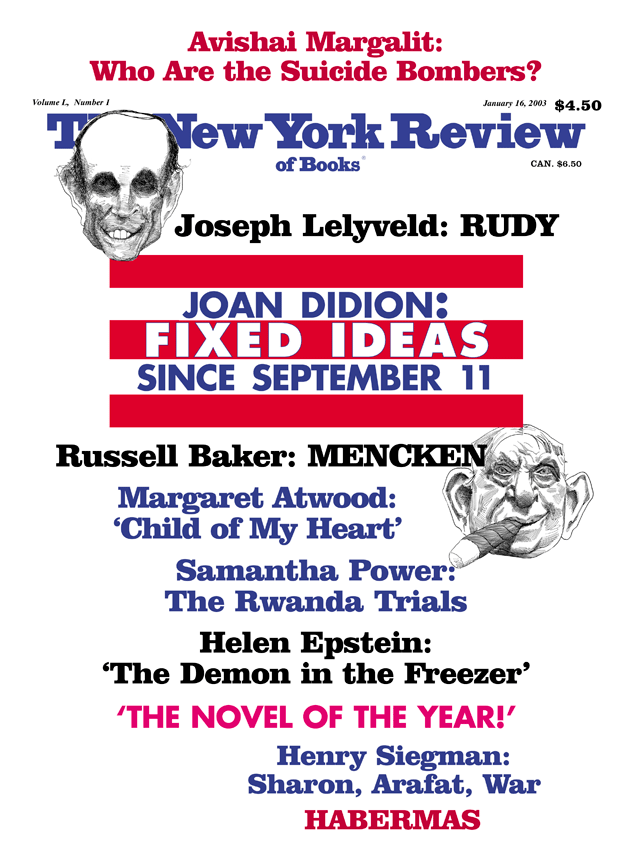To the Editors:
Charles Rosen’s review [“Within a Budding Grove,” NYR, June 21, 2001] draws good attention to the twenty-nine-volume revised edition of the New Grove Dictionary of Music and Musicians (a music encyclopedia, really, in all but name—indeed, the most respected music encyclopedia worldwide, whatever its unevennesses). I wish to respond to one puzzling paragraph in it that touches on my own “Exoticism” entry.
Rosen refers to “political correctness”—a sarcastic label that, in my experience, tends to polarize discussion (or else stifle it) by suggesting that the people who supposedly think themselves “politically correct” are intolerant, self-righteous ideologues. To be sure, he at first uses the phrase in an unaccustomed neutral or even positive sense (as if it were synonymous with “multiculturalism”): “Political correctness [in New Grove] has had a beneficial influence in the fuller representation accorded to non-Western musics.” Alas, the more usual, accusatory meaning of “political correctness” is then invoked:
But it [political correctness] has had an influence as well on the article “Exoticism,” which concentrates almost as much on fashionable theory as, in a way, on the history of the importation of music from exotic climes into European style.
The phrase “fashionable theory” seems to me no less demeaning than “political correctness”—and especially inappropriate in that my article, for much of its length, consists of a straightforward historical accounting of the musical portrayals of distant regions.
True, my article does not (as Rosen would like) discuss musical exoticism as the “importation” of foreign musical styles. I don’t believe that musical exoticism, primarily, “imports.” (My position on this is not entirely novel; it is consistent with various writings of Richard Taruskin and of the late Carl Dahlhaus, whom Rosen extols elsewhere in his review.) Rather, musical exoticism is an attempt to evoke a distant or different place, sometimes but by no means always using bits of “foreign” material, and often altering these almost beyond recognition. Verdi’s Aida conveys a sense of the unspoiled natural beauty of Ethiopia even though Verdi knew nothing of that area’s musics; and so does Elton John’s Broadway musical of the same name (even employing some of the same “exotic” devices as Verdi’s opera, such as mellifluous, sweet-sad solos for flute or oboe).
Admittedly, I do make a number of other points that border on interpretation and—the dreaded word?—theory. (1) I relate musical exoticism to musical nationalism and to program music and “characteristic styles” (a topic of real importance, as Rosen emphasizes elsewhere in the review). (2) I distinguish between exoticisms that carry overt associations and others that (as in some Debussy) are absorbed into the composer’s distinctive style. (3) I suggest that exoticism may have been at work in nineteenth-century blackface minstrelsy and in the songs—inspired by Mississippi Delta blues—of 1960s commercial “folk” musicians such as Bob Dylan and that it remains active in concert and film scores by composers who are more or less bicultural (a current example being Chinese-and-American composer Tan Dun, of Crouching Tiger fame).
If to raise such matters makes me (in Rosen’s eyes) “politically correct” (i.e., close-minded?) and too focused on “fashionable theory,” I’d like to know what he considers open-minded criticism and unfashionable cultural theory.
Ralph P. Locke
Professor of Musicology
Eastman School of Music
Rochester, New York
Charles Rosen replies:
Professor Locke looks favorably on multiculturalism and is ill at ease with political correctness. We owe to various versions of political correctness an improvement in the status of women and minorities, a greater tolerance of unorthodox sexuality, and a more serious examination of the aspirations of classes with little political power. There are benefits from multiculturalism, too, but when combined with political correctness, it has produced the absurd thesis that all cultures are equally valid or valuable, the consistent denigration of Western civilization, and the attempts to suppress any critical examination of non-Western societies.
The editors of The New Grove evidently did not allow Professor Locke the space to flesh out his ideas and provide the details that would give them a fuller meaning. His final short paragraph is an example of the regrettable constraint:
Conversely, certain musical styles or genres (such as rap) that are of primarily African-American origin have been adopted wholesale, or creatively reshaped to local tastes, by pop musicians in distant regions, from francophone Africa to the southern Pacific (see Nettl, 1985, and Lipsitz, 1994). Some pop-music critics see such non-Western borrowings as weak and undistinctive echoes of the cultural expressions of America’s minority population; others, as valid, varied and vibrant (see Mitchell, 1996).
Before the reference to the contradictory theories in the last sentence can have much significance, we would need to know how the borrowings have been “creatively reshaped” and by whose “local tastes,” what musical styles have been “adopted wholesale” and how specific aspects of the music work within the societies that enjoy them. If these details are not worth mentioning, neither are the theories currently making the rounds that so superficially attempt to assess them.
This Issue
January 16, 2003


